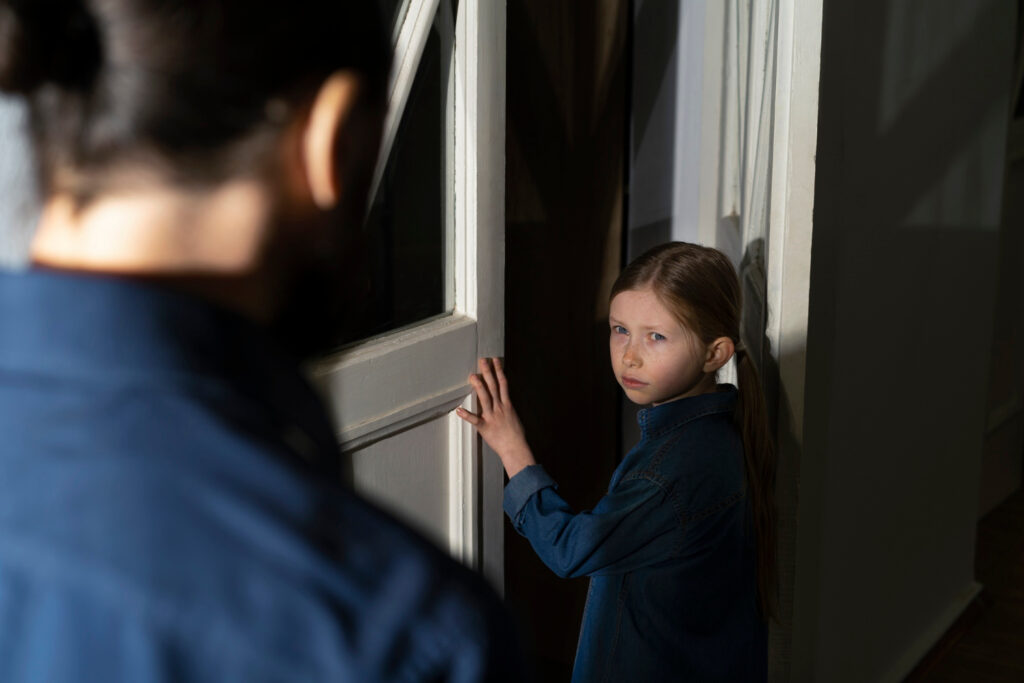
As experienced divorce lawyers at JeffMcKnightLaw, we’ve seen the devastating impact that parental kidnapping can have on families. Have you ever wondered if taking your own child without permission could land you in serious legal trouble? The answer might surprise you. Parental kidnapping isn’t just a family issue; it can be a serious crime. Dive into our article to understand the legal ramifications and protect your rights.
As indicated in federal law, parental kidnapping can be classified as a felony. The severity depends on the circumstances, such as crossing state lines. For specific laws, refer to U.S. Code Title 18, Section 1204.
What Defines Parental Kidnapping?
Parental kidnapping is not just taking a child away—it often involves crossing state or even international borders without consent, making it a complex legal issue.
As a rule, taking a child without the other parent’s permission is a crime. It goes against the court’s custody decisions and can upset the child. This is called parental kidnapping. It happens when one parent takes the child without the approval of the parent who has custody. The kidnapping parent may move the child to a new place, hide the child, or even leave the country.
It seems that parental kidnapping can happen for different reasons, such as anger, revenge, or fear of losing custody. Sometimes, the parent believes they are protecting the child from danger. However, no matter the reason, it is still illegal and can lead to serious legal trouble. Parents should sort out custody issues through the legal system and always think about what’s best for the child.
Is Parental Kidnapping a Crime?
Parental kidnapping is indeed a criminal offense.
When one parent takes a child without the permission of the other parent and against what a court has decided, it’s called parental kidnapping. This is illegal and can result in serious punishment. Parental kidnapping can cause a lot of problems, not only for the parent who took the child but also for the child.
Typically it can lead to emotional damage, legal troubles, and can hurt the relationship between the child and both parents. This act breaks the law and is not in the child’s best interest. Parents should get legal advice and help if they have custody issues to avoid parental kidnapping. By following legal steps and court orders, parents can protect themselves and their children from the bad outcomes of this crime.
Penalties for Parental Kidnapping
Parental kidnapping, or child abduction, can lead to prison sentences and hefty fines, underlining the gravity of the crime.
At the simplest level, when a parent takes a child from the other parent without permission or keeps the child against a court order, they can be charged with a crime.
The punishment for this can be different depending on the details of the case and the state where it happened. Usually, taking a child like this is a serious crime called a felony. This means the parent could go to prison for a long time and pay large fines.
Besides criminal charges, the parent who takes the child may also face other consequences. They might lose custody or visitation rights, and sometimes even their parental rights completely.
The child taken might go through emotional and psychological problems because they were separated from their home and family.
Parents should know that taking a child without legal permission is not only against the law but also harmful for the child. It’s always better to get help from legal experts and resolve issues through family court, mediation, or the police.
Taking a child without legal permission is a serious matter with big consequences for both the parent and the child. Parents should focus on what’s best for their child and seek legal help if they’re having trouble with custody or co-parenting agreements.
Legal Steps to Prevent Parental Kidnapping
Did you know that implementing measures like international treaties, such as the Hague Abduction Convention, can significantly help in preventing parental kidnapping?
Here are some simple steps to follow for a parent worried about the other parent taking their child away without permission:
- Get Sole Custody: Ask the court to give you full custody of your child.
- Define Visitation Rights: Make sure the custody agreement clearly states when the other parent can visit.
- Seek Legal Help: If you’re worried the other parent might kidnap your child, talk to a lawyer.
Additionally:
- Keep Records: Save any messages or proof if the other parent makes threats or if you have any reason to believe they might kidnap your child. To be brief, this can help in court.
- Limit Passport Access: Make sure your child’s passport is restricted so the other parent can’t take them out of the country easily.
- Inform School and Doctors: Tell your child’s school and healthcare providers about your concerns to keep an eye out for any unusual activity.
- Child Passport Alert: Sign up for the Children’s Passport Issuance Alert Program if you think the other parent might try to take your child out of the country.

How to Report Parental Kidnapping
Report a suspected parental kidnapping to law enforcement immediately, as swift action can be crucial in safely recovering the child.
Give as much information as you can about the child, the parent suspected of kidnapping, and any other important details. Time is very important in these situations, so don’t wait to ask for help. Be ready to show any evidence or documents that support your claim. Child abduction is a serious crime and must be taken seriously.
Contact the National Center for Missing and Exploited Children for more help and resources in cases of parental kidnapping. Stay calm and work with authorities to ensure the child returns safely. It’s very important to act quickly to keep the child safe from more harm or danger. Trust your instincts and report any suspicions of parental kidnapping right away.
The Takeaway
Parental kidnapping is considered a serious offense in most jurisdictions and is typically classified as a felony.
What JeffMcKnightLaw is saying to think about is, the legal consequences for committing parental kidnapping can vary depending on the circumstances of the case, such as the child’s age and the parent’s motives.
Overall, it is important for parents to understand the potential legal repercussions of taking a child without the other parent’s consent.






